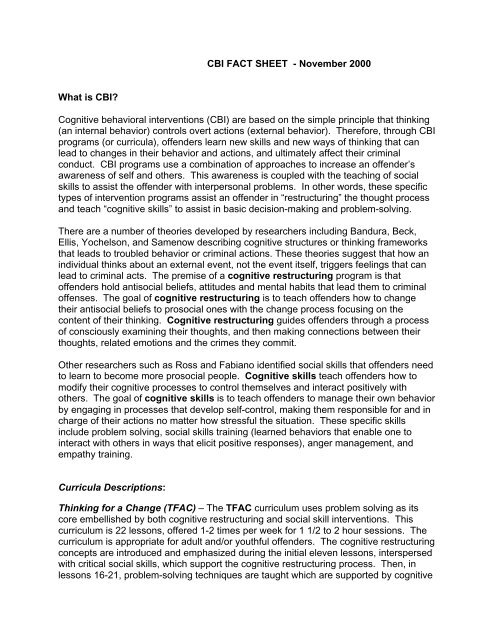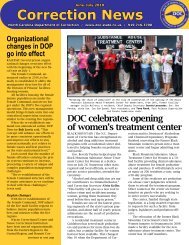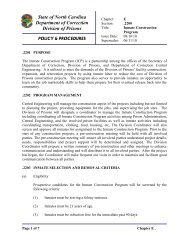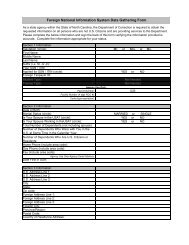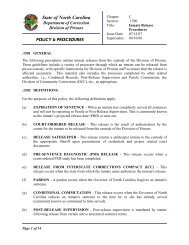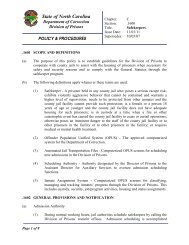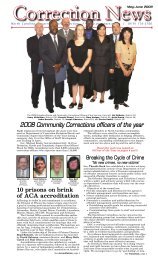CBI FACT SHEET - North Carolina Department of Corrections
CBI FACT SHEET - North Carolina Department of Corrections
CBI FACT SHEET - North Carolina Department of Corrections
You also want an ePaper? Increase the reach of your titles
YUMPU automatically turns print PDFs into web optimized ePapers that Google loves.
<strong>CBI</strong> <strong>FACT</strong> <strong>SHEET</strong> - November 2000What is <strong>CBI</strong>?Cognitive behavioral interventions (<strong>CBI</strong>) are based on the simple principle that thinking(an internal behavior) controls overt actions (external behavior). Therefore, through <strong>CBI</strong>programs (or curricula), <strong>of</strong>fenders learn new skills and new ways <strong>of</strong> thinking that canlead to changes in their behavior and actions, and ultimately affect their criminalconduct. <strong>CBI</strong> programs use a combination <strong>of</strong> approaches to increase an <strong>of</strong>fender’sawareness <strong>of</strong> self and others. This awareness is coupled with the teaching <strong>of</strong> socialskills to assist the <strong>of</strong>fender with interpersonal problems. In other words, these specifictypes <strong>of</strong> intervention programs assist an <strong>of</strong>fender in “restructuring” the thought processand teach “cognitive skills” to assist in basic decision-making and problem-solving.There are a number <strong>of</strong> theories developed by researchers including Bandura, Beck,Ellis, Yochelson, and Samenow describing cognitive structures or thinking frameworksthat leads to troubled behavior or criminal actions. These theories suggest that how anindividual thinks about an external event, not the event itself, triggers feelings that canlead to criminal acts. The premise <strong>of</strong> a cognitive restructuring program is that<strong>of</strong>fenders hold antisocial beliefs, attitudes and mental habits that lead them to criminal<strong>of</strong>fenses. The goal <strong>of</strong> cognitive restructuring is to teach <strong>of</strong>fenders how to changetheir antisocial beliefs to prosocial ones with the change process focusing on thecontent <strong>of</strong> their thinking. Cognitive restructuring guides <strong>of</strong>fenders through a process<strong>of</strong> consciously examining their thoughts, and then making connections between theirthoughts, related emotions and the crimes they commit.Other researchers such as Ross and Fabiano identified social skills that <strong>of</strong>fenders needto learn to become more prosocial people. Cognitive skills teach <strong>of</strong>fenders how tomodify their cognitive processes to control themselves and interact positively withothers. The goal <strong>of</strong> cognitive skills is to teach <strong>of</strong>fenders to manage their own behaviorby engaging in processes that develop self-control, making them responsible for and incharge <strong>of</strong> their actions no matter how stressful the situation. These specific skillsinclude problem solving, social skills training (learned behaviors that enable one tointeract with others in ways that elicit positive responses), anger management, andempathy training.Curricula Descriptions:Thinking for a Change (TFAC) – The TFAC curriculum uses problem solving as itscore embellished by both cognitive restructuring and social skill interventions. Thiscurriculum is 22 lessons, <strong>of</strong>fered 1-2 times per week for 1 1/2 to 2 hour sessions. Thecurriculum is appropriate for adult and/or youthful <strong>of</strong>fenders. The cognitive restructuringconcepts are introduced and emphasized during the initial eleven lessons, interspersedwith critical social skills, which support the cognitive restructuring process. Then, inlessons 16-21, problem-solving techniques are taught which are supported by cognitive
self-change and social skill development. This is a new curriculum presented by theNational Institute <strong>of</strong> <strong>Corrections</strong> (NIC); therefore research data are not available.Problem Solving Skills for Offenders (PSSO), recently renamed to Problem SolvingSkills in Action (PSSA) – The PSSA curriculum teaches <strong>of</strong>fenders basic social skillscritical to effective problem solving training. The curriculum is 8 lessons, and is ideallytaught for one hour per session. It is recommended that the entire curriculum is taughtwithin a 3-4 week time frame and each session is no more than 3-4 days apart.Problem Solving is appropriate for adult and/or youthful <strong>of</strong>fenders. This curriculum wasdeveloped to meet the need for a short term training experience <strong>of</strong>fered to relativelylarge groups <strong>of</strong> <strong>of</strong>fenders (16-20) <strong>of</strong>fenders). The scripted instructional unit (8 sessions)focuses upon skill acquisition while the transfer training (transfer coaching) component(6-10 weeks after completing instructional unit) emphasizes the importance <strong>of</strong> skillapplication. Research studies are ongoing, and results are available from the authors,Dr. Juliana Taymans or Dr. Steve Parese.Reasoning and Rehabilitation (R&R) – The R&R curriculum was developed in 1989by Ross, Fabiano, and Diemer-Ewies <strong>of</strong> Canada and is widely used throughout theCanadian correctional system as well as in a number <strong>of</strong> states in the US. Thiscurriculum follows a psycho-educational approach using a variety <strong>of</strong> techniques such asrole-playing, case studies, modeling demonstration, overviews and reading. Theprogram schedule is 18 weeks and is <strong>of</strong>fered 2 days a week for 2 hours each session.This curriculum is appropriate for adults and/or youthful <strong>of</strong>fenders. There are a total <strong>of</strong>36 sessions in the R&R program. The curriculum includes 9 modules: Problem Solving,Social Skills, Negotiation Skills, Managing Emotions, Creative Thinking, ValuesEnhancement, Critical Reasoning, Skills in Review, and Cognitive Exercises. Empiricalresearch studies on the R&R program are widely available.Choices and Changes – The Choices and Changes curricula are based on the adultversion <strong>of</strong> the Wisconsin THINK program. Choices and Changes use realistic stories,interactive exercises and role-plays to help <strong>of</strong>fenders gain insight regarding theirthinking, and practice pro-social skills. Both curricula are appropriate for <strong>of</strong>fendersbetween 16-19 years old. The Choices curriculum is 15 lessons, <strong>of</strong>fered 2-3 times perweek and for 1 ½ hours each session. The Choices curriculum helps <strong>of</strong>fendersrecognize and begin to challenge thoughts and beliefs that lead them to incarcerationand/or probation supervision. The Changes curriculum is 12 lessons, <strong>of</strong>fered 2-3 timesper week for 1 ½ hours each session. The Changes curriculum helps <strong>of</strong>fendersdevelop pro-social skills in goal setting, anger management and social problemsolving—skills that support the positive change begun in the Choices curriculum.These are new curricula; therefore research data are not yet available. Male and femaleversions are now available.2
Project Stats:ü More than 225 DOC staff and other criminal justice pr<strong>of</strong>essionals trained to facilitateThinking for a Change, Problem Solving Skills in Action, and Choices &Changes.ü Approximately 3,000 <strong>of</strong>fenders have participated in a <strong>CBI</strong> program in a prison facilityor community corrections setting.ü 23 Division <strong>of</strong> Prisons’ facilities are currently using TFAC and Choices & Changesand either facility staff or community college instructors are teaching these programsto inmates.ü 5 Division <strong>of</strong> Prisons’ facilities are currently using R&R and contractual staff teachthe program to inmates.ü 42 Division <strong>of</strong> Community <strong>Corrections</strong> and/or Criminal Justice Partnership Programsare currently using TFAC or PSSA.ü 26 Community College instructors representing 16 campuses have attended TFACFacilitator training. These instructors are delivering <strong>CBI</strong> in prison and communitycorrections settings.Project Highlights:qqq<strong>North</strong> <strong>Carolina</strong> was one <strong>of</strong> four states in FY 99-00 to receive technical assistancefrom the National Institute <strong>of</strong> <strong>Corrections</strong> (NIC) for Master Trainers Seminar forTFAC. <strong>North</strong> <strong>Carolina</strong> currently has 13 certified TFAC Master Trainers.Expanding the <strong>Department</strong>’s relationship with the Community College System,TFAC (in its entirety) can be <strong>of</strong>fered under the Human Resources Development(HRD) program and the Employment Readiness (PRE) program on the ContinuingEducation Master Course List.An article in the August 2000 issue <strong>of</strong> Correction News highlights the implementation<strong>of</strong> <strong>CBI</strong> at Craven Correctional Center and the Iredell Day Reporting Center.General <strong>CBI</strong> Policies & ProceduresGenerally, two (2)-trained facilitators are required to conduct a <strong>CBI</strong> group, howeveruntrained staff may serve as apprentice instructors under the supervision and guidance<strong>of</strong> trained facilitators.<strong>CBI</strong> is usually <strong>of</strong>fered twice a week for 1 ½ - 2 hours per session. No more than 15participants are allowed but the ideal group size is 8 – 10 <strong>of</strong>fenders.As a general rule, potential candidates for any <strong>CBI</strong> group should be screened forparticipation and inclusion based on the rules and regulations <strong>of</strong> the sponsoring facilityor location as well as by the <strong>CBI</strong> Facilitator conducting the group. Ideally, the <strong>CBI</strong>Facilitator will be able to select from a group <strong>of</strong> potential participants to ensure anappropriate balance to maintain group integrity.3


